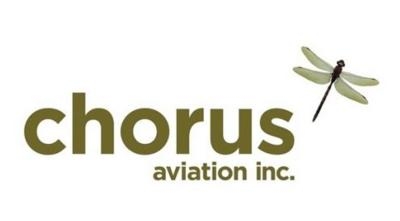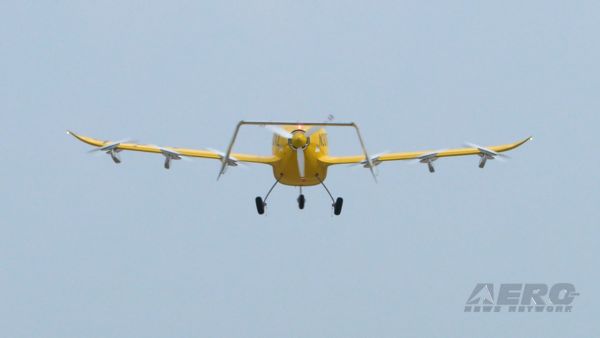Expects The Current Disruption To The Airline Industry To Be Temporary, But Can't Predict Its End
Chorus Aviation says it is in a strong position to weather the challenges imposed by the COVID-19 pandemic that is causing severe disruptions in the Airline industry.

The outbreak combined with the measures taken to contain the spread of COVID-19 have resulted in significant reductions in airline passenger volumes, requiring airlines around the world to take immediate measures to reduce costs. Although the company's business model does not directly expose it to the market risks ordinarily faced by airlines, substantially all of its source revenue is derived from airline customers. Chorus is party to a Capacity Purchase Agreement ('CPA') with Air Canada pursuant to which Jazz performs regional flying operations across Canada and into the United States and earns a fee for this service, in addition to aircraft leasing revenue. The company also leases aircraft to airline customers globally. Chorus expects the current disruption to the airline industry to be temporary, however, its duration and the full extent of its impact are unknown.
"The disruption to the global airline industry caused by COVID-19 is unprecedented; however, Chorus has entered this crisis stronger than ever. These are very uncertain and difficult times for everyone, including our employees who have contributed significantly to our current strength," said Chorus president and CEO Joe Randell. "We have a collaborative long-term partnership with Air Canada, a well-diversified aircraft leasing portfolio holding high-quality assets, and specialty MRO and contract flying capabilities that give us unique capabilities to transition aircraft for ourselves and third parties. We are certainly not immune to the challenges facing the airline industry; however, the work we have done in the last few years to solidify the CPA and diversify our business has positioned us well to manage through this challenging period."
Chorus is working with its main customer and partner, Air Canada, as it adjusts to the significant demand reductions seen in its business. The CPA contains provisions which allow Air Canada to reduce its utilization of the Jazz fleet, and the parties are currently in discussions regarding schedule changes and cost mitigation measures for the Jazz operation. In accordance with the CPA, all resulting savings from such measures will accrue to Air Canada's benefit with any cost exposure to Jazz being limited to the $2 million guardrail under the contract.1 Furthermore, the compensation paid to Jazz under the CPA does not vary with the amount of flying and is fixed based on agreed annual amounts.
Chorus has also been in close contact with its airline leasing customers. Given the challenging environment, many of our lessees have requested some measure of temporary rent relief coupled with a covenant to repay the deferred amounts in regular instalments following the end of the deferral period. Consistent with market norms, our leases are generally for a fixed term, contain an absolute payment obligation on the part of the lessee, and cannot be terminated early for convenience. That said, Chorus has been individually assessing requests from its customers having regard to, among other factors, the financial condition of each lessee, the economics of the transaction and our debt service obligations for the particular aircraft.
The company's Voyageur subsidiary is engaged in specialty contract flying, primarily for international organizations engaged in humanitarian relief missions, and specialty maintenance, repair, overhaul and parts sales. Voyageur's business has not been impacted as profoundly as commercial passenger airlines and it currently represents less than 10% of Chorus' consolidated revenue and net income.
Chorus currently has a strong liquidity position with a current cash balance of C$132 million. In addition, the company has a C$100 million revolving operating facility, of which C$75 million is committed and C$25 million is uncommitted. This facility can be used to fund working capital at the company and its Jazz and Voyageur subsidiaries. It currently has a drawn balance (including letters of credit) of C$20.5 million.
The company owns, through subsidiaries, four unencumbered aircraft in its third-party lease portfolio that are currently on lease to customers. To further improve its cash position, Chorus is in the process of raising approximately USD $50 million in financing to be secured by these assets. These financings are currently anticipated to close in the coming weeks and will add to Chorus' liquidity.
The company also has a $300 million (U.S.) warehouse facility for its leasing business, of which $180 million remains undrawn and available to finance aircraft acquisitions for lease once market conditions rebound.
Chorus is in compliance with its financial covenants and in the event that it needed to repossess aircraft due to a lessee insolvency or other default, the company's aircraft financing agreements typically provide a remarketing period of between six to nine months before the principal outstanding is due.
The company anticipates having sufficient liquidity to fund ongoing operations, planned capital expenditures, principal and interest payments related to long-term borrowings and the payment of dividends. For greater certainty, this includes the ability to manage the repossession and remarketing of the aircraft previously on lease to Flybe, and manage rent deferrals with its leasing customers. However, in order to further bolster its strong liquidity during this time of market disruption, Chorus is discussing additional financing options with an existing credit partner.
Chorus is currently scheduled to receive delivery of nine Bombardier CRJ900 aircraft in 2020 for operation and lease by Jazz under the CPA with Air Canada. The deposits on these aircraft have been previously paid, and the company has a financing commitment for these aircraft.
Chorus had previously indicated its intention to grow its third-party leasing business by approximately 20 aircraft per year, representing approximately $650 million (U.S.) in capital investment, of which approximately 75% is typically funded with secured debt. The majority of the capital raised to date to fund the company's portion of this funding have been retained to shore up liquidity until such time as market conditions improve.
Chorus has one pending near-term transaction involving the delivery of two ATR 72-600 aircraft with an existing strong customer, which Chorus intends to finance concurrent with the deliveries. Chorus expects that all remaining commitments for aircraft deliveries in 2020 (namely, three Airbus Q220-300 aircraft and one ATR 72-600) will be deferred or cancelled.
Chorus originally projected aircraft related acquisitions and extended service program capital expenditures in 2020 of C$442 to C$452 million. Chorus has implemented a capital investment deferral program and as such has now reduced those estimates to C$300 to C$310 million.
In addition, Chorus is maintaining its dividend reinvestment plan which, based on the current participation rate, is generating C$22 million in annual cash savings.
Finally, the company is implementing measures across its business to reduce its operating costs, conserve cash and ensure its resiliency.
(Source: Chorus Aviation news release. Image from file)
 Senator Pushes FAA to Accelerate Rocket Launch Licensing
Senator Pushes FAA to Accelerate Rocket Launch Licensing Classic Aero-TV: RJ Gritter - Part of Aviations Bright New Future
Classic Aero-TV: RJ Gritter - Part of Aviations Bright New Future Aero-FAQ: Dave Juwel's Aviation Marketing Stories -- ITBOA BNITBOB
Aero-FAQ: Dave Juwel's Aviation Marketing Stories -- ITBOA BNITBOB ANN's Daily Aero-Linx (10.27.24)
ANN's Daily Aero-Linx (10.27.24) ANN's Daily Aero-Term (10.27.24): Clearance Void If Not Off By (Time)
ANN's Daily Aero-Term (10.27.24): Clearance Void If Not Off By (Time)



